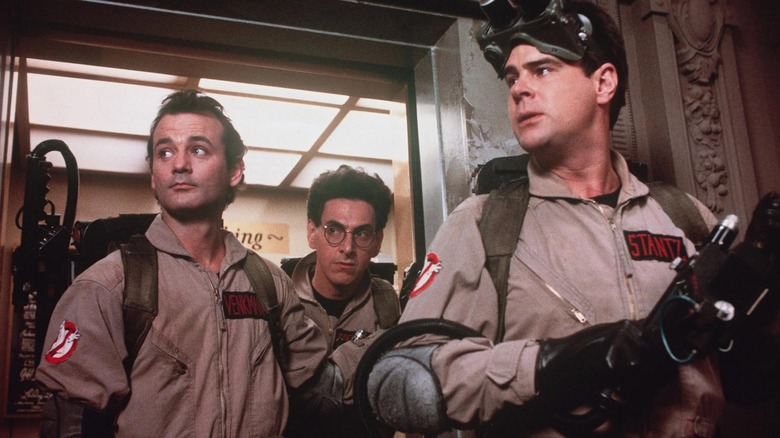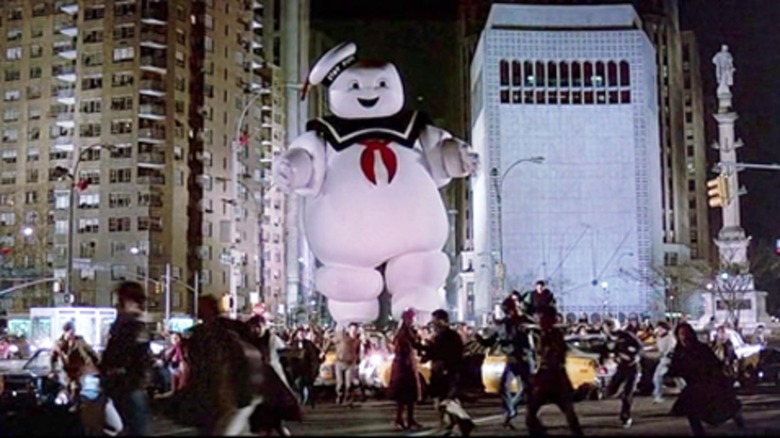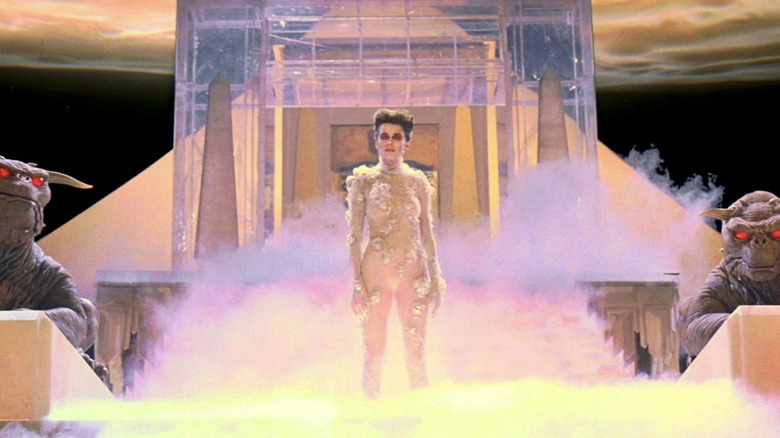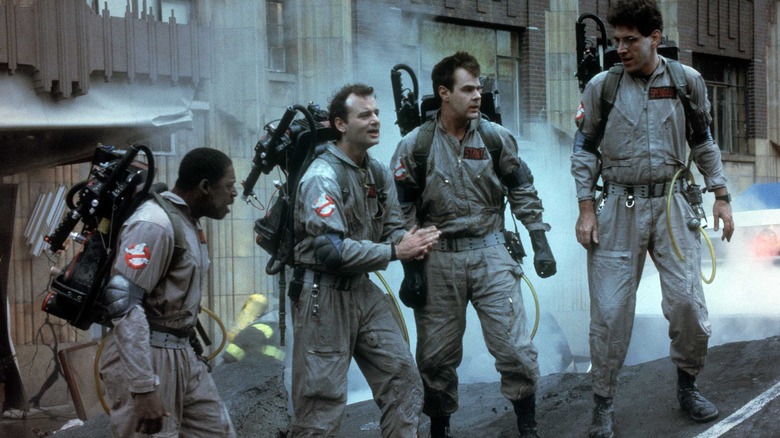Dan Aykroyd's Original Ghostbusters Script Was Vastly Different
"If there's something strange, in your neighborhood, who you gonna call? Ghost...smashers??"
Yes, "Ghost Smashers" was the not-so-catchy title of Dan Aykroyd's first draft that would go on to become the 1984 supernatural comedy hit, "Ghostbusters." Ivan Reitman's blockbuster became a pop culture phenomenon and remains a perennial favorite today, yet it could have been a very, very different movie if Aykroyd's original concept had made it to the big screen.
Aykroyd is a passionate spokesperson for the paranormal, coming from a family with a long history in Spiritualism. After leaving "Saturday Night Live" in the late '70s, he channeled those beliefs into an idea for a star vehicle for himself and his "The Blues Brothers" partner John Belushi. He imagined it as a ghostly comedy like one those old spooky capers with Bob Hope or Abbott and Costello, just with more action. Much, much more action...
We now know "Ghostbusters" as the story of a team of parapsychologists who go into business catching pesky spirits that are terrorizing the citizens of New York City, culminating in a rooftop showdown with a malignant inter-dimensional entity known as Gozer, plus a 100-foot-tall marshmallow man. Yet Aykroyd's original script for "Ghost Smashers" was even more fantastical and ambitious, involving time travel and multiple dimensions. While the basic premise was the same, how much did it differ from the classic movie it became?
What were the biggest differences?
Aykroyd set "Ghost Smashers" in the future of 2012 where, thanks to some far-fetched technobabble, a hole has been ripped in the fabric of reality, allowing ghosts and other entities to pass through into our world. This surge of paranormal activity has led to a new profession sprouting up — ghostbusting.
In his original vision, the ghostbusters were already formed and there were many teams, both good and bad, competing against each other. They also had a boss called Shandor, who sounds reminiscent of Rip Torn's Chief Zed in "Men in Black," and were more like pest control guys who people could call out in an emergency.
The tone of the screenplay was darker, typified by the appearance of the Ectomobile. While the vehicle was always based on a Cadillac ambulance, it had a far more sinister appearance, with a black paintjob and white-and-purple strobe lights. It could also dematerialize to evade the law, indicating the more shadowy nature of the original ghostbusters.
Similarly, Slimer, then known as "onion-head," wasn't so cute, and the damage caused when the ghostbusters' containment system blows up was far more apocalyptic. Instead of holding the ghosts in the fire station, they stored them in a New Jersey gas station instead. When that baby goes up, it creates a 25 kilometer sinkhole that triggers a blazing inferno.
The Big Bad was still Gozer, but its appearance varied wildly from draft to draft, from a kindly-looking older gent resembling Bert Parks to a swirling psychic maelstrom topped by a disembodied aphid's head of monstrous proportions.
Everyone's favorite church-stomping marshmallow man originally appeared around the midway point as one of Gozer's several manifestations. The ending was significantly different, whisking the ghostbusters away to alternate dimensions instead of the now famous rooftop showdown...
How did "Ghostbusters" become the film we know today?
After John Belushi's death in 1982, Aykroyd showed his half-completed script to another of his old SNL pals, Bill Murray, who liked the idea. Aykroyd then pitched it to director Ivan Reitman, who had worked with Murray and Harold Ramis on "Stripes." He thought the concept was great but immediately saw that Aykroyd's vision would be financially unrealistic.
As Reitman said in "Making Ghostbusters" by Don Shay:
"For one thing, it was set in the future... and it took place on a number of different planets or dimensional planes. And it was all action. There was very little character work in it. The Ghostbusters were catching ghosts on the very first page – and doing it on every single page after that – without respite, just one sort of supernatural phenomenon after another. By the tenth page, I was exhausted. By the fortieth or fiftieth page – however many there were – I was counting the budget in hundreds of millions of dollars..."
Aykroyd kept working at it, and turned in a 180-page script in early 1983. Reitman then suggested story changes which ultimately became the final screenplay for "Ghostbusters." The original draft of "Ghost Smashers" was lost, passing into film folklore.
Some original casting choices are intriguing, and any combination would have resulted in a far different tone to the film. Aykroyd wanted Murray to play Venkman after Belushi passed away, but several other names were bandied around, including Tom Hanks, Richard Pryor, Steve Gutenberg, and Robin Williams.
Aykroyd originally had Eddie Murphy in mind for Winston, while John Candy and Sandra Bernhard were considered for the parts of Louis and Janine. The role of Gozer was earmarked for Paul Reubens before eventually passing to Serbian model Slavitza Jovan.
Where the changes for the better?
Aykroyd's original idea sounds more like a cartoon and the big changes definitely made more sense for "Ghostbusters." Firstly, removing the alternate dimension stuff and concentrating the action in Manhattan gives the film a real identity — it feels like a great New York movie. Also, moving it to a contemporary setting rather than an '80s vision of the future probably saved it from dating too badly. Sure, the special effects are very much of their time, but "Ghostbusters" has aged remarkably well.
The change that makes the biggest difference to how the film plays out is following the ghostbusters from the start of their career, and making them the only guys in town offering ghost-catching services. While they the experts in their field, they are still novices when it actually comes to catching ghosts and ghouls, so the film takes us along on the ride with them. It's great that we see them running scared from the library ghost at the start — these aren't tough guys and they react just how we probably would. They fret about money, waste petty cash on takeaways, and retreat fearfully when they first fire up their proton packs. They face skepticism and snootiness from all corners, which makes their success all the more rewarding, and gets us onboard for when they face a far deadlier foe. They might be toast of the town, but they're still underdogs for that final confrontation with Gozer.
Ultimately, who knows? "Ghost Smashers" might have still been a huge hit even set across multiple dimensions with Robin Williams doing silly voices as Venkman and Pee-Wee Herman as the big villain. Here in our dimension, we've got an endlessly quotable comedy classic that truly stands the test of time.



